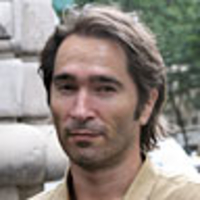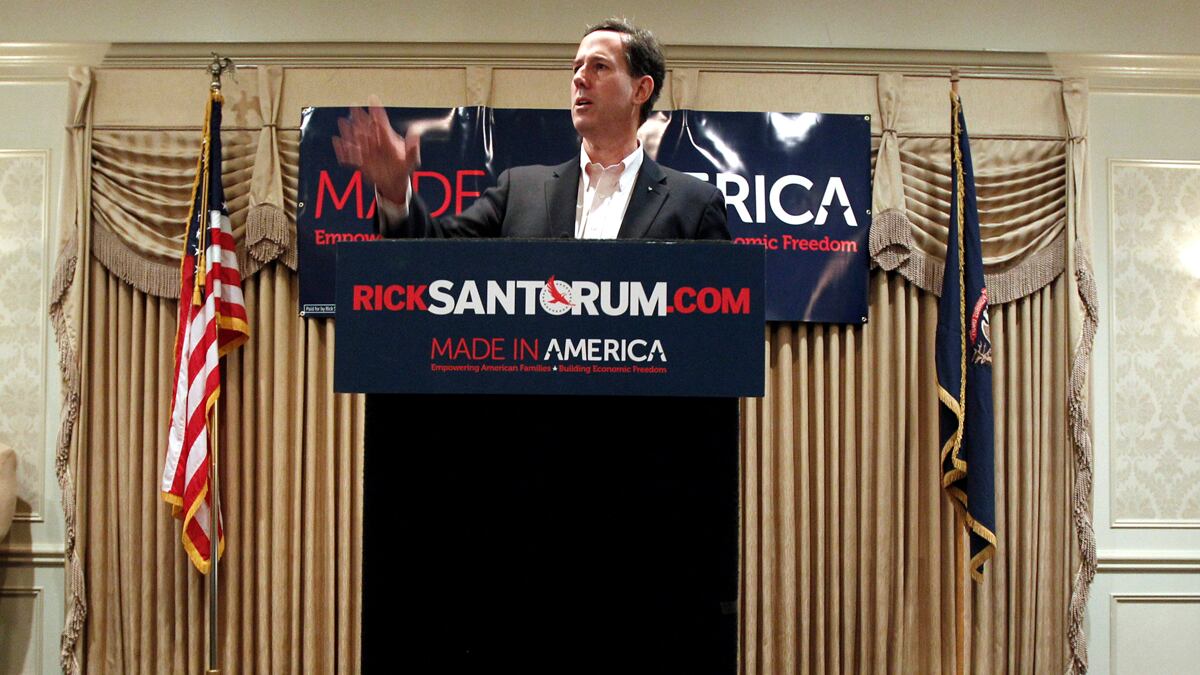Cher Rick,
I know you’re busy trying to take down Michigan’s native son Mitt Romney in the primary—which can’t be easy, given that this year’s French-scented Oscars are stealing your limelight—but I hope you have a moment for me.

Of late, you’ve seemed a bit obsessed with France. Your recent campaign speeches and debate comments have taken aim at the French’s ally skills, constitution, and revolution. Heck, you’ve even come down on the guillotine in your attacks on President Obama.
You have lambasted Obama—who, as you might have guessed, remains popular in France—for cozying up to “Prime Minister” Nicolas Sarkozy, who isn’t. (The French would be happier if their president was merely prime minister.)
Impressively, you went deep into French history, culture, and philosophy in one of your longer French monologues. After noting that the American and French revolutions took place around the same time and that they have similar visions and constitutions, you pointed out a key difference.
The French Revolution, you noted, was based on three core principles: “Liberty—good. Equality—excellent. But the third was different. The third was fraternity, brotherhood. Not paternity, fatherhood,” you told an approving crowd as you pointed toward the heavens. The French revolutionaries “did not claim that their rights were inalienable … from God. It was a secular revolution, of which we relied upon the goodness of each other.” (At that point, you raised your eyebrows, perhaps to suggest, who really believes that we can rely on the good of others?)
And then you went to your ultimate point: “This is the left’s view of where America should go. And of course, where did France go? To the guillotine, to tyranny. If there are no rights that government needs to respect, then what we see with Obamacare is just the beginning of what government will do to you.”
I have been living in Paris for many years, so I thought I should clarify some things. Perhaps you see the City of Light as a godless and sex-soaked land of Sodom and Gomorrah, basically an alternate-universe New York City with stinkier cheeses and even more porous wedding vows.
But surrounded by Frenchness, I have to say that it never crossed my mind, this idea of an intellectual conspiracy between Obama and his French comrades, all in the name of beheading American liberty—and faith. Perhaps you have resolved the French enigma, Richard.
Some people will surely say that you are wrong. Or crazy. But somehow you delve behind the nation’s diplomatic presentation of politesse, beneath the palace intrigues and the veneer of capitalism, and offer this unique vision of the French soul.
Critics might argue that you are stuck in 2003—especially when you suggested that the French have not been supportive of the U.S. “with anything” in the past 20 years. Perhaps, they might say, you remain jilted by France’s extravagant diplomatic actions to prevent the U.S. from leading the invasion of Iraq. (How dare then-President Jacques Chirac and his flame-haired prime minister, Dominique de Villepin, argue with Dick Cheney’s assessment that “liberated” Iraqis would welcome American soldiers with flowers, not bullets, and that the war would be over in a jiffy.)
As for your mockery of President Obama for allegedly saying that Sarkozy is “our best ally” precisely because, in your analysis, the French “fought what was in the best interest of our country,” Francophiles would surely be up in arms. They could highlight France’s supportive roles from the Balkans and Kosovo to, most recently, Libya, where President Sarkozy helped to force Muammar Gaddafi from power. They might also point to the close Franco-American antiterror cooperation and note that 82 French military personnel have given their lives as part of the decade-long U.S.-led NATO mission in Afghanistan.
But the French are legendarily crafty, as you would surely point out, Rick. Heck, they invented the word “sabotage.” Such actions clearly aim to lull freedom-loving, God-fearing Americans into a false impression so that France can shoot us in the back or steal our women yet again.
And the French have allies on American shores. Hollywood is promoting the glorification of France’s aesthetic beauty better than any tourism campaign ever could. Look at the Best Picture category at the Oscars, where two stylized films set in the nostalgic French past—Midnight in Paris and Hugo—face off against a black-and-white film, The Artist, that is French-made, albeit in Hollywood. How effective are they? Woody Allen’s French movie is the biggest cash cow of his career, while The Artist has gobbled up American awards like a hungry gringo at a breakfast buffet in a Parisian hotel.
Yes, the problem for a sober-eyed culture warrior like you is that this French snow job seems to be winning over America. Sixty-five percent of Americans say that they “like France,” according to an extensive survey published Feb. 22 in France. Sacrebleu! (Such people will be well represented among the hordes of Americans who touch down in Paris—the most visited city on earth—this spring.)
In fact, I have a confession to make, Rick. There are moments when trying to track down these French conspiracies wears on me. I suffer moments of doubt, apparently unlike you. Sometimes I think, yes, my friends face the tyranny of functional and affordable medical coverage that costs the French state far less than America’s, but there are other instances when I begin to think that a break from the campaign trail might do your soul some good. Perhaps you would even consider a little vacation in France.
I know it sounds crazy, but there are aspects of this land of the Enlightenment that might seduce you, so to speak. After all, this is the nation where one of the world’s most famous sin-soaked sex symbols, Brigitte Bardot, converted into a fully clothed woman who dedicated her life to protecting animals. (She would applaud your legislative efforts to regulate “puppy mills,” and more broadly, you might agree on a wide array of other policies.)
And if you can see past Nicolas Sarkozy’s two divorces and his current bohemian first lady, Carla Bruni-Sarkozy, you would understand that “Sarko l’Americain” has things in common with you. Like you, he is a fertile Catholic—he has four children to your seven—and he is tough on Iran, so a President Santorum might just want to call on him when ordering America’s bombers into action. (Yes, Sarkozy has had those children with three different women, but isn’t Catholicism also about forgiveness?)
Look, you wouldn’t need to be embarrassed about coming to France, at least not in this election. Two of your remaining competitors, Newt and Mitt, may perpetuate outdated stereotypes of France any chance they get, but they both chose lengthy stints in France when they were young.
Maybe I, like many Americans who arrived in Paris in their youth, am naive. Perhaps you are all just cynically calculating political manipulators who attack France as a sort of political red meat in your primaries. (The French are one of the few groups that you can still rhetorically beat on without being accused of racism or discrimination. In rhetorical terms, perhaps you think that Gay Paree is the new gay.) But I prefer to believe in the fundamental goodness of man.
So given that you are unlikely to find the time for a visit to France, and given that this is Oscar season, I’ll just suggest that you take in a film about this place. Something tells me that you aren’t a big Woody fan, and you might be hesitant to see a motion picture by an Italian-American director who is famous for graphic Mafia films.
That is why The Artist might be the perfect fit. It looks beautiful, and it is set in a long-gone era when things were black and white. Most importantly, it allows you to enjoy what is best about France without ever having to listen to the French.





